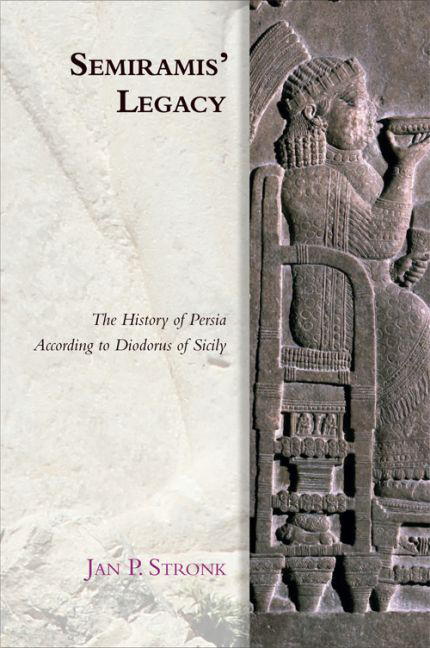Book contents
- Frontmatter
- Contents
- List of Figures and Tables
- Preface
- Abbreviations
- Series Editor's Preface
- Map
- Introduction: Diodorus' Work and Our Sources
- 1 Diodorus’ Sources
- 2 Ancient History: Assyrians, Chaldeans, and Medes
- 3 The Persians and the Greek Wars
- 4 Revolt and Sedition
- 5 Alexander the Great Defeats Darius III
- 6 From Persepolis to Babylon
- 7 The Period of the Diadochs: The Rift Opens
- 8 The Period of the Diadochs: The Rift Deepens
- 9 The Vicissitudes of the Diadoch Kingdoms: The Final Years of Diodorus' Persian Account
- 10 Semiramis' Legacy
- Conclusion
- Bibliography
- Index of Classical Sources
- Index of Modern Authors
- General Index
5 - Alexander the Great Defeats Darius III
Published online by Cambridge University Press: 10 May 2017
- Frontmatter
- Contents
- List of Figures and Tables
- Preface
- Abbreviations
- Series Editor's Preface
- Map
- Introduction: Diodorus' Work and Our Sources
- 1 Diodorus’ Sources
- 2 Ancient History: Assyrians, Chaldeans, and Medes
- 3 The Persians and the Greek Wars
- 4 Revolt and Sedition
- 5 Alexander the Great Defeats Darius III
- 6 From Persepolis to Babylon
- 7 The Period of the Diadochs: The Rift Opens
- 8 The Period of the Diadochs: The Rift Deepens
- 9 The Vicissitudes of the Diadoch Kingdoms: The Final Years of Diodorus' Persian Account
- 10 Semiramis' Legacy
- Conclusion
- Bibliography
- Index of Classical Sources
- Index of Modern Authors
- General Index
Summary
[[The first chapters of book 17 are devoted to the rise of Alexander after the murder of Philip. Since they have no direct relationship with the history of Persia, I have omitted them from this account.]]
DARIUS III CODOMANNUS (C. 380–330)
S. 114:
17.4.9:
Alexander is appointed commander plenipotentiary of the Greeks:
(17.4.9) After Alexander had called a meeting at Corinth of both envoys and delegates, and when the usual representatives came, as the king spoke to them using moderate terms, he convinced them to pass a resolution that Alexander be commander plenipotentiary of the Greeks and to join together in an expedition against Persia seeking satisfaction for the offences which the Persians had committed against Greece. Having obtained this tribute, the king returned to Macedonia with his army.
S. 115:
17.5.3–7.10:
Developments in the Achaemenid Empire; Artaxerxes III is murdered:
(17.5.3) As we will now discuss the kingdom of the Persians, we must pick up the history a little earlier. In fact, while Philip II was still king, Artaxerxes III Ochus ruled the Persians and oppressed his subjects cruelly and harshly. Because he was hated for the savagery of his manners, the chiliarch Bagoas, though being a eunuch in physical fact, but by nature malicious and quarrelsome, killed him by poison administered by a physician and placed upon the throne Arses, the youngest of the sons of the king. He similarly killed the brothers of the new king, who were barely of age, in order that the young man, being isolated, would be more obedient to him. However, because the young king was disgusted with these outrages against the law and made it clear that he was prepared to punish the author of these crimes, Bagoas, anticipating his intentions, killed Arses and his children in the third year of his reign. Because the royal house was extinguished and there was no one in the direct line of descent to succeed, Bagoas, selecting one of his friends, by the name of Darius, secured the throne for him. He was the son of Arsanes, the son of Ostanes, who was a brother of Artaxerxes II, king of the Persians.
- Type
- Chapter
- Information
- Semiramis' LegacyThe History of Persia According to Diodorus of Sicily, pp. 275 - 333Publisher: Edinburgh University PressPrint publication year: 2017



